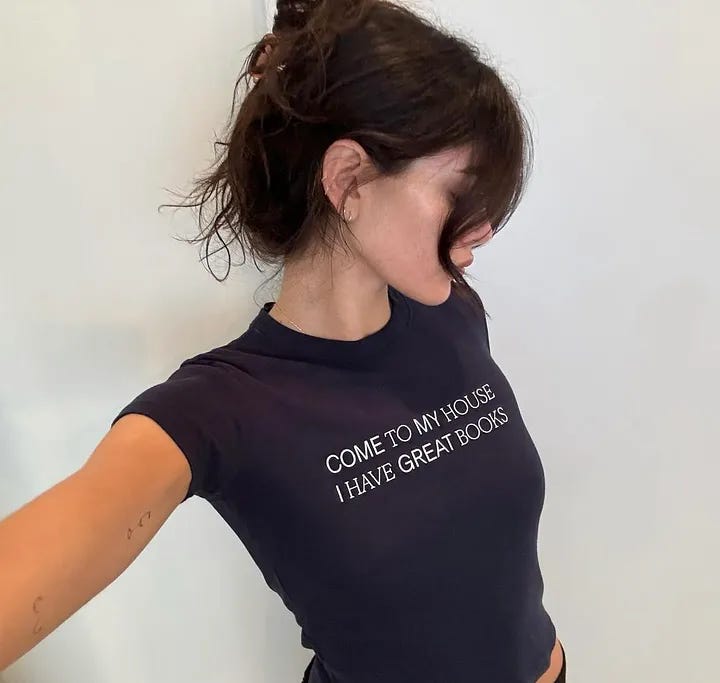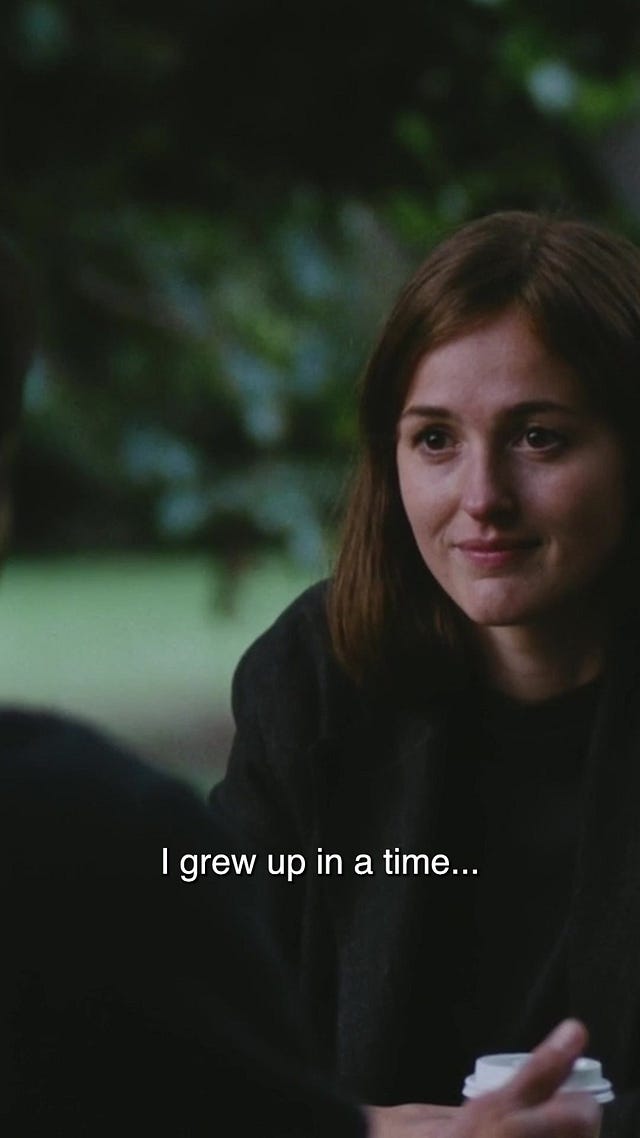Welcome to the latest edition of The Gen Zer. This week, we discuss literary culture, book clubs, and whether they’re helping to connect Gen Zers in a disconnected world. We also take a look at how social media is getting Zers to budget, the generation’s love of labels (hot rodent men, anyone?) and more . . .
Can book culture cure loneliness?
I recently came across an initiative that’s been set up in New York. Describing itself with the tagline ‘Not a book club. A reading party,’ Reading Rhythms organises events where your time is split between reading in companionable silence and talking to strangers about the books you’re all reading. There’s no set text — you bring whatever you want to read, and I guess this helps spawn the conversations that follow. (“What are you reading?” being a fairly safe ice-breaker here.)
Of course, Reading Rhythms isn’t exactly a book club, more of a social hangout for book lovers, but it still uses literature to fulfil a basic human need. For the past few years loneliness levels have been steadily rising worldwide. It was exacerbated by covid, but the pandemic is far from the only reason why so many of us feel disconnected from those around us. There are hundreds of contributing factors for our growing atomism: addictive social media, polarising algorithms, a loss of third places and community ties, a cost of living crisis, and so on.
For Gen Z, these influences have starkly come into play throughout our adolescence. I recently read a great piece here on Substack by
of , which talked about how so many Gen Zers are nostalgic for a time we never had: a childhood free of phones, where instead of checking Snapchat or Instagram – and recording everything that goes on – teens simply hung out, with no phone camera in sight.There’s little doubt that a change is needed. 73% of Gen Zers reported feeling alone sometimes or always, according to a survey by Cigna, and those aged 16 to 24 are more lonely than any other age group. There’s a stereotype that over 65s are the most alone in society, and yet Gen Zers in the prime of their youth, with all the opportunities of technology at their fingertips, are somehow lonelier.
As a generation, we’re hyper-connected but socially disconnected. We need initiatives like Reading Rhythms to bring us together, in real life, where the main focus isn’t school or work or politics.
Focusing on books allows for a welcome escape. Stories have been keeping us together for tens of thousands of years. In the dark winter nights of palaeolithic times, telling stories (and talking about stories) allowed us to forget the stresses of the outside world and empathise with the characters and with each other. It helped build community.
#
In the oldest known library in the world, an inscription above the doorways read, The house of healing for the soul. Now, in modern times, Gen Zers desperate for a third place are rediscovering the joys of libraries. In-person visits to the library are up 71%. Zers on TikTok are romanticising the simple act of going there, reading, and enjoying some time away from work and home (although, as a generation, there seems to be little that we aren’t romanticising, but anyway).
We’re also buying more books, too — and, despite what you might think, we’re opting for physical books over digital. In a survey conducted by Pew Research in 2021, almost 70% of 18 to 29-year-olds said they read print books, compared to the 42% who read e-books. Overall more than 80% read books in any format, which was higher than for any other age group surveyed.
We’re also reading widely; Zers seem to have a penchant for literary and translated fiction, as well as for classics and memoirs. And, of course, things like romantasy — you’ve heard of Sarah J. Mass, right?
For better or for worse (but I think for the better), BookTok has played a large role in all of this. Videos with the #booktok hashtag have been viewed over one-hundred-billion times, and the publishing industry as a whole has been seeing a resurgence since 2018, which has been at least partly attributed to the bookish TikTok community.
The wider culture has changed, too: reading is sexy now. Celebs have been getting involved, from Timothée Chalamet name-dropping Dostoevsky’s Crime and Punishment as one of his favourite books, to the internet going slightly wild when Kendall Jenner posed with a copy of Tonight I’m Someone Else by Chelsea Hodson: a collection of essays on the objectification and commodification of the body, complete with Jenner’s post-it notes stuck to the pages.
Chalamet and Jenner are both 28 and so just outside of the Gen Z age bracket, though there are plenty of ‘lit girls’ who are solidly Gen Z. The 22-year-old Kaia Gerber (who runs the book club Library Science) recently went viral after posting with a t-shirt featuring a famous quote from a 1979 Éric Rohmer film, and there are at least a few Zers out there rocking indie literary tote bags.


Not everyone will be so impressed by celebs posing with books or using lit culture to get likes. Some people complain about performative reading and the commercialisation of all of this, though others might argue that, hey, at least they’re reading. Most of these celebrities are going to be posting on Instagram either way. The fact that they’re indirectly encouraging people to pick up a book — and hopefully open it, too — doesn’t really seem like a bad thing. At least Gerber wasn’t wearing a tee saying ‘Come to my house for drugs and porn.’
#
Overall, I don’t think that book culture has all the cures for modernity’s darker sides. There are a lot of issues out there, and talking about books with your friends isn’t going to solve everything. But it might help.
For me and a few of my friends, meeting up for a book club once a month has been a great way to schedule in some meaningful time together. Basing the meet-ups around a book gives a solidity to the conversation that would be lost if we were just discussing politics or the latest viral videos we’ve seen online. Books are real, tangible, timeless things — the kinds of things that friendship and community can be built around.
For Gen Zers in a disconnected world of social media, 24-hour news cycles, and viral trends that never last a week, book culture is a chance for something else: shared experiences, meaningful escapes, and perhaps even a little healing for the soul.
Gen Z around the Web
the latest stories in youth culture and changing trends . . .
How Gen Z made the crossword their own (ny times)
For all those puzzle lovers amongst you. Gen Z crossword constructors have steadily been changing the nature of the game, with a greater focus on individuality — and, of course, a healthy splash of meme culture along the way. Read more
From brat summer to hot rodent men: why Gen Z love a label (the times)
So it’s not just me who thinks that everything is being labelled nowadays? I’d be curious to hear what you guys think about this — is it annoying? quirky? fun? Say what you want about Gen Zers, but we’re certainly original. Read more
Gen Z more likely to set a budget than baby boomer generation (the standard)
According to NatWest, nearly 75% of 18 to 24-year-olds say they have tried out social media challenges to boost their overall savings. It’s nice to see we can still use the internet for nice things. Read more
David Hogg’s fearless bet that Gen Z politicians can save American democracy (fast company)
Fast Company have written a few pieces on US Gen Z politicians recently, chronicling why they went into politics and what they hope to achieve. Given the state of things across the pond, it’ll be interesting to see the role Gen Zers play over the next few months in the upcoming election. Read more
That’s all for this week! Make sure to subscribe for the latest on Gen Z and youth culture, and check out The Common Thred for a weekly roundup of the latest news, trends and thought pieces.
See ya soon,
@









books are life, reading is life, and friendship is life!!!!!!!
It is so nice to see this sub culture building and helping young people rediscover reading. Tks for sharing...